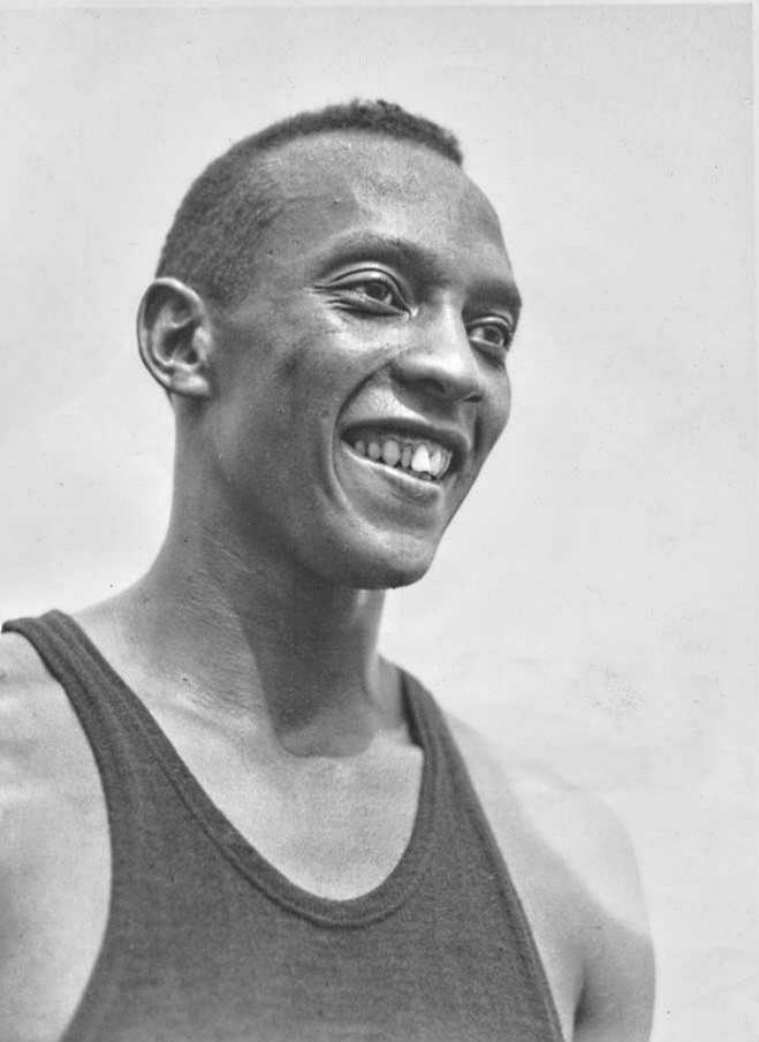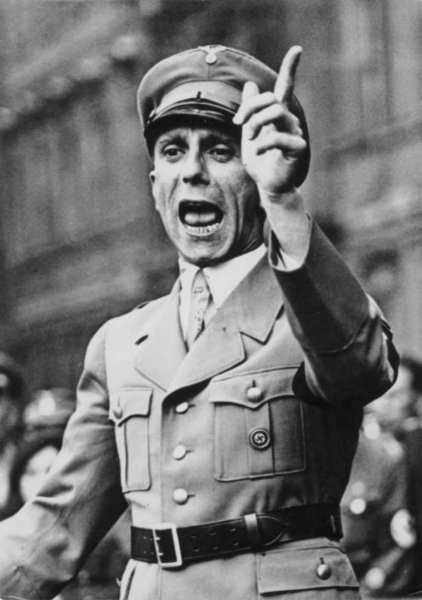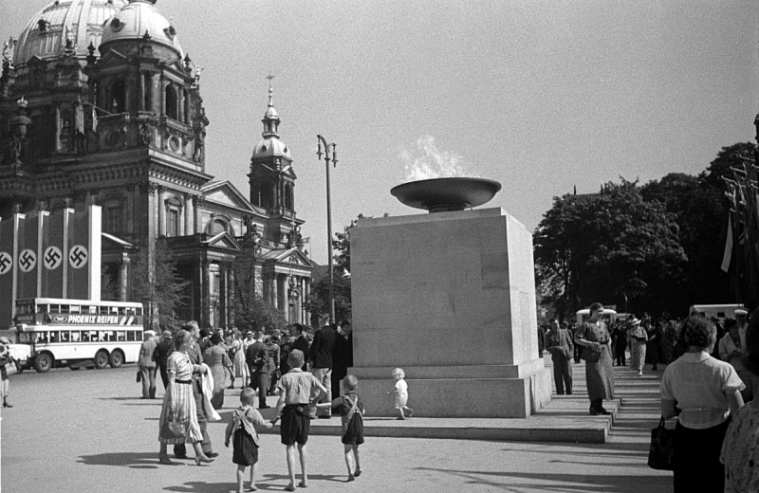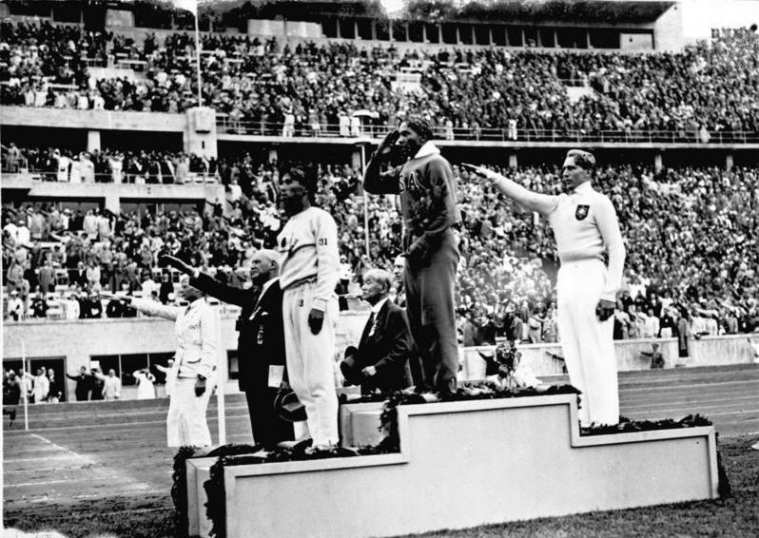What action did Hitler take in order to leave a good impression on foreign visitors to the Olympics?
When Jesse Owens ran, nix else mattered. Fluid, languid and loose, everything effectually him was a breeze as his trunk faced the runway like a catapult. Fifty-fifty as cold, drizzly rain barbarous, Owens moved his limbs in sweeping, lyrical motion defying time.
Information technology was the summer of 1936 in Berlin. Red, white and black Nazi swastika flags flew out of every shop window. Through the Olympic Games, German language Chancellor Adolf Hitler had put in his best possible endeavor to put on the greatest show on earth and showcase his warped political utopia in which whatsoever athlete, or whatsoever human being for that affair, of not-Aryan descent had very little space.
Only it was the summer when Jesse Owens ran — against his opponents, confronting time and against the Nazi k narrative — likewise lite-footed to bear on solid ground. And when he bankrupt the record in 10.3 seconds in the 100-metre finals, tying his own Olympic tape, his customary bow to Hitler from the victory stand was simply acknowledged with a stiff salute. When an aide asked the High german Chancellor to invite Owens over to his viewing box, multiple accounts state that Hitler had savagely replied, "Practise you really think that I will permit myself to be photographed shaking hands with a Negro?"
 It was the summer when Jesse Owens ran — against his opponents, confronting time and against the Nazi thou narrative — too light-footed to touch solid basis. (Wikimedia Commons)
It was the summer when Jesse Owens ran — against his opponents, confronting time and against the Nazi thou narrative — too light-footed to touch solid basis. (Wikimedia Commons)
But Owens could not care less. All through the summer, he was a breeze, jumping, catapulting, twisting, turning and running into glory, scripting history with four gold medals. This was supposed to be Hitler's moment in the sunday — the summer when the Führer through the grandest of glasses on the biggest of stages had hoped to acquire more political capital for his project of Aryan supremacy. Merely it was the summer when Jesse Owens ran.
Nazi propaganda and Goebbels's large dream
When initial talks were held regarding Germany hosting the Olympics in 1936, Hitler had no interest in the matter. He even went on to dismiss the Games equally an "invention of Jews and Freemasons" and called it a class of idealistic theatre "which cannot possibly be put on in a Reich ruled by National Socialists".
It was, however, his Minister of Propaganda, Joseph Goebbels, who convinced him that the Olympics can be a slap-up platform for projecting the Nazi ideology, writes Christopher Hilton in Hitler's Olympics: The 1936 Berlin Olympic Games. Goebbels was always keen to explore newer avenues to disseminate propaganda and he felt that the possibilities of doing this through the Olympics were truly limitless. Forth with Hitler, he started working to make the stage the greatest advertisement for their Aryan supremacist ideology and German nationalism.
 Goebbels once said in 1933 that the only task of sports in the country was "to strengthen the grapheme of the German people." (Wikimedia Commons)
Goebbels once said in 1933 that the only task of sports in the country was "to strengthen the grapheme of the German people." (Wikimedia Commons)
Goebbels once said in 1933 that the simply task of sports in the country was "to strengthen the grapheme of the German people, imbuing it with the fighting spirit and steadfast esprit necessary in the struggle for its existence". Now, he gear up the wheels into move to execute his plans with an middle on the Berlin Olympics.
Away from the field of sport, merchandise unions were beingness banned, Communist property being seized and books considered to be "unGerman" were being burnt. Nazi eugenics, with its business firm belief in the superiority of Aryans, was a rage, with Jews beingness stripped of their rights and arranged off to concentration camps. All marriages between Aryans and Jews had been banned and a Race Council set to stop mixed marriages. The Nazis' secret state police, the Gestapo, was holding prisoners and torturing them at Columbia-Haus.
In January 1934, Goebbels set up a body to wait after all the publicity during the Berlin Games — while the organising committee would handle all the Olympics news, there were subcommittees to deal with the press, radio, film and fine art. During another meeting, plans of epic proportions were made to decorate Berlin for the consequence, with artists existence enlisted to pattern posters and medals. It was during this meeting that the idea of holding a torch relay from Hellenic republic to Berlin was first mooted.
The Aryan supremacist ideology had invaded the field of sports in Germany by and then, as described by Anton Rippon in Hitler's Olympics: The Story of the 1936 Nazi Games.
On February 26, 1933, Erich Seelig, who was then the 22-year-old middleweight and lite-heavyweight champion of Germany, and also a Jew, was warned on the eve of his scheduled defense of his middleweight title in Berlin that he would be killed if he entered the ring. He was ultimately stripped of his German titles by the Nazis, after which he fled to France and so to the US. He would go on to fight for both the European and world middleweight championships and was eventually elected to the New Jersey Boxing Hall of Fame.
Sadder still is the story of some other High german boxing champion, Johann 'Rukelie' Trollman, a fellow member of the Sinti gypsy tribe, who had won a bout against Kiel boxer Adolf Witt in 1933 but the decision was reversed i week later on the basis of "poor behaviour" and "bad boxing". When he was pitted confronting the German welterweight champion Gustav Eder the following month, Trollman was ordered to abandon his usual boxing mode or chance losing his license. He suffered a heavy defeat and lost his path in life — he was later on arrested by the Gestapo and died in a concentration military camp.
On April 25, 1933, the Reich Sports Function implemented an 'Aryans-just' policy in all German sports organisations and the following month the German Gymnastic Order decreed that Aryan ancestry was absolutely mandatory for membership of the Turnvereine (gymnastic associations). Soon, the All-German Chess Convention excluded Jews from its membership and non-Aryans were prohibited from being jockeys, amateur or professional.
However, with the Berlin Games non far off, these decisions had international ramifications. What was happening in Germany caught the attending of the International Olympics Committee (IOC), and the American delegation told the IOC in a meeting that the Games should not be held in Berlin if the position of the Nazis remained unchanged.
Speculation that the Games volition not be held in Berlin began to gain momentum, with the New York Times in April 1933 running the headline '1936 Olympic Games May Be Cancelled'. By 1935, the IOC had an agreement that made it compulsory to allow Jewish athletes to compete in the Berlin Games. However, Hitler said that the rule should apply only for visiting teams; otherwise, he would phase its own version of 'High german Olympics'. Amidst the widespread speculation that the Berlin Olympics would be cancelled or at least boycotted by many, several countries started planning their own 'counter Olympics' in protest. For example, an Olimpiada Popular (People'south Olympic Games) was planned for Barcelona, with the thought being supported by the leftwing coalition, the Popular Front end.
In that location were lingering hopes that the Nazis may make amends ahead of the Berlin Games just it was not to be. Amidst the hundreds of stories of bigotry in Germany leading upwards to the Olympics was that of Gretel Bergmann, a Jewish track and field athlete who was a likely gold medal prospect in the high bound category.
As Bergmann would write later recounting the moment she opened the alphabetic character informing her of the conclusion non to include her in the German language team, "I opened information technology and I cursed my head off. I used every word I had ever learnt and that was a lot considering I was the only girl in my grade…I was absolutely stunned."
The grandest of glasses
Soon after coming to ability, Hitler said, "If Deutschland is to stand host to the entire world, her preparations must exist complete and magnificent." And at present, to present his country and his supremacist ideology to the world, he wanted to play host to the grandest of glasses.
The High german Chancellor deployed two,600 men to build a stadium out of stone that could adapt ane,00,000 spectators — a project that cost 42 million Reichsmarks. An Olympic hamlet with a swimming stadium, a hockey arena and dormitories for the athletes was too built.
The Games were heavily promoted, with the Zeppelin Hindenburg, the world's largest balloon, towing an Olympic flag across the Berlin sky. Thousands of people rehearsed for months with marching bands to take part in the opening ceremonies. And more than iii,000 runners were asked to carry the Olympic torch from Athens to Berlin. The stage was prepare for his fantasy to play out — all German teams had been nearly purged of not-Aryan athletes, and all Jewish or non-Aryan athletes in opposition teams had to exist beaten to vindicate his credo of racial superiority.
German language journalists were ordered to apply the Olympics to further Hitler's propaganda and warned not to publish anything before receiving the official printing report on events. The Ministry of Propaganda also expressly warned journalists that reports well-nigh Rassenschande (sex between Aryans and Jews) should be reduced to a minimum.
Before the Games got underway, loudspeakers blared announcing Hitler's thou entry into the stadium. The French and the Austrian teams were given a continuing ovation for extending their arms in a Nazi salute. There was considerable confusion later when the French claimed that they had intended to requite the Olympic salute but the Germans did non know the difference.
Throughout the Games, the persona of Hitler dominated proceedings — he was present for every bit many events as possible, and his arrival was always marked past the raising of his standard at ane finish and the Olympic flag at the other. As Australian high-jumper Doris Carter would afterward say, it was very apparent even by looking at the Berlin Games that Hitler was preparing for war.
 The Olympic fire in Berlin. (Wikimedia Commons)
The Olympic fire in Berlin. (Wikimedia Commons)
Hilton wrote in Hitler's Olympics that the 13th day of the Games was marked by a military parade at the Olympic Stadium. "Four searchlights played over the swastika at the east cease, the Olympic flame over the Marathon Gate, the Olympic and Führer's standards at Hitler's box. The march-past came in a great, molten, controlled ripple from the tunnel beneath the Marathon Gate, soldiers goose-stepping and holding torches…The soldiers marched past Hitler to ecstatic applause. To use the Olympic Stadium during an Olympic Games for a military parade was an act which made all its ain statements."
A well-known anecdote from the Berlin Games is when Dhyan Chand met Hitler after Bharat defeated Germany eight-1 in the final of the men's field hockey, the High german Chancellor told him: "If you were a German language, I would accept at least fabricated you a major general."
Also read|When sports legend Dhyan Chand was offered a job by Adolf Hitler
At the finish of the day, German athletes did triumph at the Berlin Olympics, winning 89 medals (more than any other country), out of which 33 were gold.
But if the Berlin Games with all its pomp and politics — this was the commencement Olympics to exist televised, with CCTVs dissemination events onto 28 large screens placed effectually the streets of Berlin — is remembered as Hitler's projection to showroom his supremacist ideology, it is also recalled to this day as the summer when Jessie Owens defied the narrative and emerged as an unlikely hero.
When Jessie Owens ran…
Mayhap the reason why Owens could upstage Hitler'southward project at an event which was meant to be a triumphant display of German prowess was simpler than one could imagine — the African American student of Ohio State University had come up to the Olympics to run and nothing else mattered to him.
The National Clan for the Advancement of Colored People Secretary, Walter Francis White, had tried to write to Owens dissuading him from taking role in the Berlin Games as it would "promote a racist regime", but he never sent the alphabetic character.
Merely going into the Olympics, some Americans did take high hopes on Owens. Just a year ago, at the Big Ten Championships in Ann Arbor, Michigan, on May 25, 1935, Owens had set up four new world records in the space of 45 minutes.
The Alabama boy had till then seen harrowing poverty — he wrote in his biography that since their family lacked the funds to pay for their medical expenses, his mother performed makeshift surgery on him at abode, carving the boils out of his flesh with a red-hot kitchen knife. Owens, who had fought against all odds, was determined to make his marker in the Berlin Games.
From Baronial 3 to v in 1936, Owens won gold in three events. He won the 100-metre dash with a time of 10.3 seconds, was the champion in the long jump with a spring of 8.06 metres and won the 200-metre sprint with a time of 20.7 seconds.
Ralph Metcalfe, who had won two Olympic medals in Los Angeles, finished second in the 100-metre nuance while in the long jump Owens edged out Deutschland'due south Lutz Long.
By then, the legend of Owens was growing. Even in the hostile temper marked past Hitler'south grandstanding, his popularity amidst the German crowd in Berlin was unmistakable. Equally Tony Gentry in Jesse Owens: A Champion Athlete writes, a British observer among the audition who was diddled away by Owens remarked, "No sprinter I have ever seen has run in such effortless style. He was in a form above all other competitors; his artillery and legs worked in perfect rhythm, and he carried his running correct through the tape."
Later, Owens was inducted into the US 400-metre relay race team, replacing sprinters Marty Glickman and Sam Stoller. The decision was not without controversy simply information technology paved the way for a fourth gold medal for Owens at the Berlin Games — an unprecedented feat past a track athlete.
Many in the German crowd had been a convert past so and amidst those who could non hide their admiration for Owens was Hitler's handpicked cinematographer Leni Riefenstahl. As Gentry writes in his book on Owens: "She [Riefenstahl] filmed the entire 1936 Olympic Games in a sweeping, lyrical mode that highlighted the beauty of each event while downplaying all the hoopla over winners and losers. Jesse Owens was her athletic platonic. In her filming of the 100-meter contest, her cameraman zoomed in on Owens's thigh, neglecting all the other runners to show his perfectly toned muscles in action. Similarly, her portrayal of the Owens–Long duel in the long jump centres on the soaring grace of their leaps, not on their battle for the gold. Riefenstahl's film, Olympiad, is sometimes shown on television, specially during Olympic years, and it is easy for a viewer to be drawn into her awe at the magnificence of athletic achievement and particularly at the seemingly effortless beauty of Jesse Owens in full flying."
Many later questioned the narrative that Hitler had snubbed Owens — subsequent reports have claimed that they did in fact milkshake easily after the 100-metre finals. Owens himself said at a Republican rally in Baltimore afterwards, "Some people say Hitler snubbed me. But I tell you, Hitler did not snub me."
 Owens salutes the American flag afterwards winning the long leap. (Wikimedia Commons)
Owens salutes the American flag afterwards winning the long leap. (Wikimedia Commons)
However, what cannot exist doubted is past then Owens had scripted his own destiny and shot into unforeseen limelight and fame. Owens would say that he realised he "had jumped into another rare kind of stratosphere — i that just a handful of people in every generation are lucky enough to know".
The success of Owens proved to exist a great moment of schadenfreude for all who had criticised and questioned Hitler's supremacist ideology. And it was of particular badgerer to Hitler himself. Every bit Emma Anspach, et. al write in their essay titled 'Hitler, Nazi Philosophy and Sport', Nazi minister Albert Speer afterwards mentioned that Hitler "was highly annoyed by the serial of triumphs past the marvellous coloured American runner, Jesse Owens. People whose antecedents came from the jungle were primitive, Hitler said with a shrug; their physiques were stronger than those of civilized whites and hence should be excluded from future games".
Owens, whose success ushered in a fleet of swift African American sprinters over the ages, had famously said that he did well in Berlin because, "I let my feet spend as piffling fourth dimension on the basis equally possible".
That Hitler's ideology had cast its long and impenetrable shadow over the Berlin Olympics in 1936 was an unmistakable fact. But information technology was also the summer when Jessie Owens ran.
Further reading:
Anton Rippon, Hitler'due south Olympics: The Story of the 1936 Nazi Games (Barnsley: Pen and Sword Military, 2006)
Christopher Hilton, Hitler'due south Olympics: The 1936 Berlin Olympic Games (Gloucestershire: Sutton Publishing, 2006)
Tony Gentry, Jesse Owens: Champion Athlete (Philadelphia: Chelsea House Publishers, 2005)
Source: https://indianexpress.com/article/research/how-with-4-olympics-golds-jesse-owens-ran-hitler-out-of-his-aryan-supremacy-theory-7425918/
0 Response to "What action did Hitler take in order to leave a good impression on foreign visitors to the Olympics?"
Post a Comment